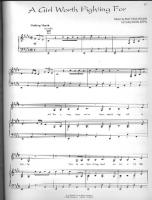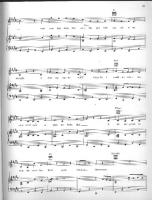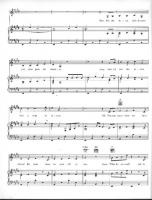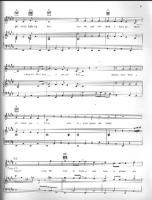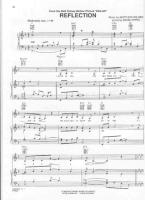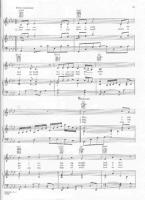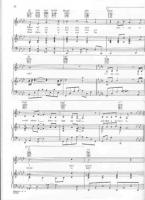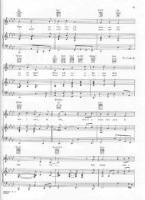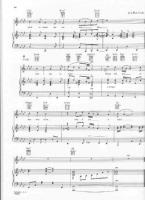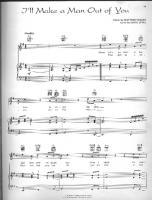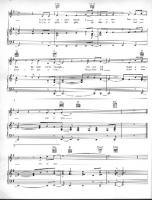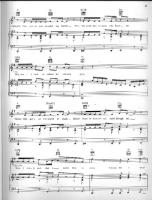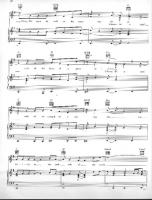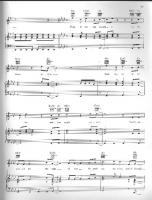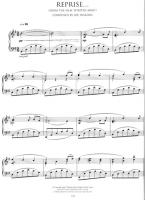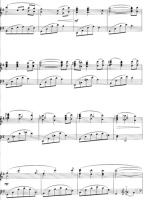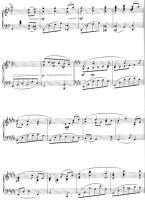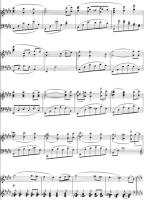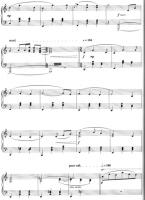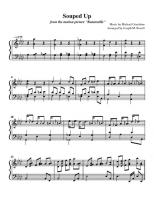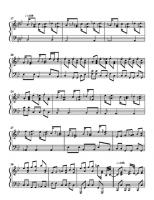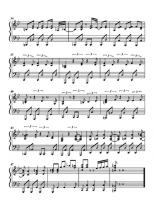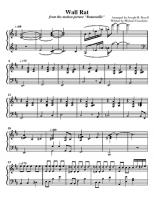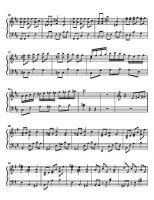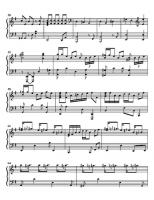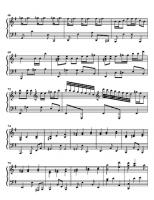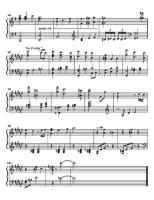Piano Sheet Music
 "... I don't like to go into the studio with all the songs worked out and planned before hand ... you've got to give the band something to use its imagination on as well. That can make a very ordinary song come alive into something totally different ... the X-factor - so important in rock and roll - which is the feel.." Keith Richards / Rolling Stones
"... I don't like to go into the studio with all the songs worked out and planned before hand ... you've got to give the band something to use its imagination on as well. That can make a very ordinary song come alive into something totally different ... the X-factor - so important in rock and roll - which is the feel.." Keith Richards / Rolling Stones
Beauty and the Beast
 Beauty and the Beast is a 1991 animated American family film. It is the thirtieth animated feature produced by Walt Disney Feature Animation. The film received its premiere at the El Capitan Theatre in Hollywood on November 13, 1991. This film, one of the best known of the Disney studio's films, is based on the well-known fairy tale Beauty and the Beast, about a beautiful woman kept in a castle by a horrific monster. It is the first and only full-length animated feature film to ever be nominated for an Academy Award for Best Picture (it lost to The Silence of the Lambs). Heightening the level of performance in the era known as the Disney Renaissance (1989-1999, beginning with The Little Mermaid and ending with Tarzan ), many animated films following its release have been influenced by its blending of traditional animation and computer generated imagery.
Beauty and the Beast is a 1991 animated American family film. It is the thirtieth animated feature produced by Walt Disney Feature Animation. The film received its premiere at the El Capitan Theatre in Hollywood on November 13, 1991. This film, one of the best known of the Disney studio's films, is based on the well-known fairy tale Beauty and the Beast, about a beautiful woman kept in a castle by a horrific monster. It is the first and only full-length animated feature film to ever be nominated for an Academy Award for Best Picture (it lost to The Silence of the Lambs). Heightening the level of performance in the era known as the Disney Renaissance (1989-1999, beginning with The Little Mermaid and ending with Tarzan ), many animated films following its release have been influenced by its blending of traditional animation and computer generated imagery.Beauty and the Beast ranked 7th on the American Film Institutes's list of best animated films, #22 on the Institutes's list of best musicals and #34 on its list of the best romantic American movies. On the list of the greatest songs from American movies, Beauty and the Beast ranked #62. The film was adapted into a Broadway musical of the same name, which ran from 1994 to 2007.
In 2002, Beauty and the Beast was added to the United States National Film Registry as being deemed "culturally, historically, or aesthetically significant." In January of the same year, the film was reissued in IMAX format in a special edition edit including a new musical sequence. A two-disc Platinum Edition DVD release followed in October.
Mulan
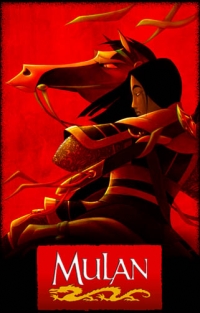 Mulan is a 1998 animated feature film produced by Walt Disney Feature Animation, and released by Walt Disney Pictures on June 19, 1998. The thirty-sixth animated feature in the Disney animated features canon, the film is based on the Chinese legend of Hua Mulan, and was the first of three produced primarily at the animation studio at Disney-MGM Studios in Orlando, Florida. It was directed by Tony Bancroft and Barry Cook, with the story by Robert D. San Souci and Rita Hsiao, among others. The film was part of the Disney Renaissance that began in 1989.
Mulan is a 1998 animated feature film produced by Walt Disney Feature Animation, and released by Walt Disney Pictures on June 19, 1998. The thirty-sixth animated feature in the Disney animated features canon, the film is based on the Chinese legend of Hua Mulan, and was the first of three produced primarily at the animation studio at Disney-MGM Studios in Orlando, Florida. It was directed by Tony Bancroft and Barry Cook, with the story by Robert D. San Souci and Rita Hsiao, among others. The film was part of the Disney Renaissance that began in 1989.
Spirited Away
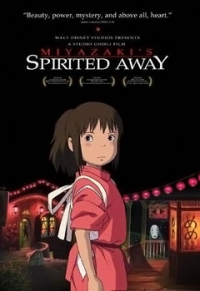 Spirited Away - literally Sen and Chihiro's Spiriting Away is a 2001 film by the Japanese anime studio Studio Ghibli, written and directed by famed animator Hayao Miyazaki.
Spirited Away - literally Sen and Chihiro's Spiriting Away is a 2001 film by the Japanese anime studio Studio Ghibli, written and directed by famed animator Hayao Miyazaki.The film received many awards, including the second Oscar ever awarded for Best Animated Feature, the first anime film to win an Academy Award, and the only winner of that award to win among five nominees (in every other year there were three nominees). The film also won the Golden Bear at the 2002 Berlin International Film Festival (tied with Bloody Sunday).
The closing song, Always With Me was written and performed by Yumi Kimura, a composer and lyre-player from Osaka. The lyrics were written by Kimura's friend Wakako Kaku. The song was intended to be used for a different Miyazaki film which was never released, Rin the Chimney Painter. In the special features of the dvd, Hayao Miyazaki explains how the song in fact inspired him to create "Spirited Away".
The other 20 tracks on the original soundtrack were composed by Joe Hisaishi. His The River of That Day received the 56th Mainichi Film Competition Award for Best Music, the Tokyo International Anime Fair 2001 Best Music Award in the Theater Movie category, and the 16th Japan Gold Disk Award for Animation Album of the Year. Later, Hisaishi added lyrics to "Ano hi no Kawa" and named the new version The Name of Life which was performed by Hirahara Ayaka.
Beside the Original Soundtrack, there is also an Image Album, which contains 10 tracks.
The Lion King
 The Lion King is a 1994 American animated feature film produced by Walt Disney Feature Animation, released in theaters on June 15, 1994 by Walt Disney Pictures. It is the 32nd film in the Disney animated feature canon. The film was the highest grossing animated film of all time until the release of Finding Nemo (a Disney/Pixar computer-animated film). The Lion King still holds the record as the highest grossing traditionally animated film in history. This film also belongs to an era known as the Disney Renaissance.
The Lion King is a 1994 American animated feature film produced by Walt Disney Feature Animation, released in theaters on June 15, 1994 by Walt Disney Pictures. It is the 32nd film in the Disney animated feature canon. The film was the highest grossing animated film of all time until the release of Finding Nemo (a Disney/Pixar computer-animated film). The Lion King still holds the record as the highest grossing traditionally animated film in history. This film also belongs to an era known as the Disney Renaissance.The story, which was strongly influenced by the Shakespearean play Hamlet and Disney's 1942 classic Bambi, takes place in a kingdom of anthropomorphic animals in Africa. A musical film, The Lion King garnered two Academy Awards for its achievement in music. Songs were written by composer Elton John and lyricist Tim Rice, with an original score by Hans Zimmer. Disney later produced two related movies: a sequel, The Lion King II: Simba's Pride; and a part prequel-part parallel, The Lion King 1½.
The Lion King: Original Motion Picture Soundtrack is the original motion picture soundtrack for Walt Disney's The Lion King. The songs were written by Elton John and Tim Rice. The original score was composed and arranged by Hans Zimmer. The soundtrack was recorded in three different countries, namely: USA, UK and South Africa.
Charlie Brown
 Charles "Charlie" Brown is the main character in the comic strip Peanuts by Charles M. Schulz.
Charles "Charlie" Brown is the main character in the comic strip Peanuts by Charles M. Schulz.
Ratatouille
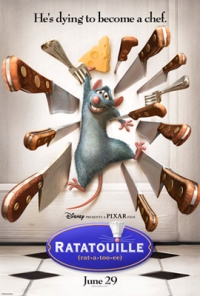 Ratatouille is a 2007 computer-animated family film produced by Pixar and distributed by Walt Disney Pictures. The film was the eighth movie produced by Pixar, and was directed by Brad Bird, who took over from Jan Pinkava in 2005. It was released on June 29, 2007 in the United States, to both critical acclaim and box office success. The title refers to a French dish which is served in the film, and is also a play on words on the species of the main character.
Ratatouille is a 2007 computer-animated family film produced by Pixar and distributed by Walt Disney Pictures. The film was the eighth movie produced by Pixar, and was directed by Brad Bird, who took over from Jan Pinkava in 2005. It was released on June 29, 2007 in the United States, to both critical acclaim and box office success. The title refers to a French dish which is served in the film, and is also a play on words on the species of the main character.Ratatouille is the original soundtrack album, on the Disney label, of the 2007 Academy Award-winning animated feature Ratatouille. The album is composed by Michael Giacchino. "Le Festin", sung by French musician and vocalist Camille, was nominated for a World Soundtrack Award in 2007 and is the film's only song with vocals. On the CD edition of the soundtrack, the song appears as the album's first track with the remaining 23 tracks orchestral in nature.
The entire score was nominated for "Best Original Score" at the 80th Academy Awards.
Shrek
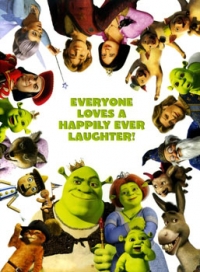 The Shrek film series from DreamWorks Animation, based on William Steig's picture book, Shrek!, consists of eight projects, three of which have been released as feature films: Shrek (2001), Shrek 2 (2004), and Shrek the Third (2007). Shrek Goes Fourth is currently in pre-production, aiming for release in 2010. Shrek 5 is a sequel proposed for release in 2013. A spin-off project, the Christmas television special Shrek The Halls, premiered on ABC in the USA and worldwide in 2007 to successful ratings. One film is in the development phase, Puss in Boots: The Story of an Ogre Killer, expected to be released in 2011.
The Shrek film series from DreamWorks Animation, based on William Steig's picture book, Shrek!, consists of eight projects, three of which have been released as feature films: Shrek (2001), Shrek 2 (2004), and Shrek the Third (2007). Shrek Goes Fourth is currently in pre-production, aiming for release in 2010. Shrek 5 is a sequel proposed for release in 2013. A spin-off project, the Christmas television special Shrek The Halls, premiered on ABC in the USA and worldwide in 2007 to successful ratings. One film is in the development phase, Puss in Boots: The Story of an Ogre Killer, expected to be released in 2011.
Toy Story
 Toy Story is a 1995 American computer-generated comedy film, directed by John Lasseter and starring Tom Hanks and Tim Allen. The film was produced by Pixar Animation Studios and Buena Vista Distribution. It was written by Joss Whedon, Andrew Stanton, Joel Cohen, and Alec Sokolow, and featured music by Randy Newman.
Toy Story is a 1995 American computer-generated comedy film, directed by John Lasseter and starring Tom Hanks and Tim Allen. The film was produced by Pixar Animation Studios and Buena Vista Distribution. It was written by Joss Whedon, Andrew Stanton, Joel Cohen, and Alec Sokolow, and featured music by Randy Newman.The top-grossing film on its opening weekend, Toy Story went on to gross over $191 million in the United States during its initial theatrical release and took in more than $356M worldwide. Reviews were overwhelmingly positive, praising both the technical innovation of the animation and the wit and sophistication of the screenplay.
In addition to DVD releases, Toy Story-inspired merchandise has run the gamut from video games and costumes to model trains and shoes. Buzz Lightyear's classic line "To infinity and beyond!" has seen usage not only on T-shirts, but among philosophers and mathematical theorists as well.
Toy Story is the original soundtrack album, on the Disney label, of the 1995 Academy Award-winning animated feature Toy Story.
The Simpsons
 The Simpsons is an American animated sitcom which was created by Matt Groening for the Fox Broadcasting Company. It is a satirical parody of the middle class American lifestyle epitomized by its titular family, which consists of Homer, Marge, Bart, Lisa, and Maggie. The show is set in the fictional town of Springfield, and it lampoons many aspects of the human condition, as well as American culture, society as a whole, and television itself.
The Simpsons is an American animated sitcom which was created by Matt Groening for the Fox Broadcasting Company. It is a satirical parody of the middle class American lifestyle epitomized by its titular family, which consists of Homer, Marge, Bart, Lisa, and Maggie. The show is set in the fictional town of Springfield, and it lampoons many aspects of the human condition, as well as American culture, society as a whole, and television itself.The family was conceived by Groening shortly before a pitch for a series of animated shorts with the producer James L. Brooks. Groening created a dysfunctional family and named the characters after members of his own family, substituting Bart for his own name. The shorts became a part of The Tracey Ullman Show on April 19, 1987. After a three-season run, the sketch was developed into a half-hour prime time show and was an early hit for Fox, becoming the first Fox series to land in the Top 30 ratings in a season (1992-1993).
Since its debut on December 17, 1989, the show has broadcast 420 episodes and the twentieth season will commence airing in on September 28, 2008. The Simpsons Movie, a feature-length film, was released in theaters worldwide on July 26 and July 27, 2007, and has grossed approximately US$526.2 million worldwide to date.
The Simpsons has won dozens of awards since it debuted as a series, including 24 Emmy Awards, 26 Annie Awards and a Peabody Award. Time magazine's December 31, 1999 issue named it the 20th century's best television series, and on January 14, 2000 it was awarded a star on the Hollywood Walk of Fame. The Simpsons is the longest-running American sitcom and the longest-running American animated program. Homer's annoyed grunt "D'oh!" has been adopted into the English lexicon, while The Simpsons has influenced many adult-oriented animated sitcoms.
The series' distinctive theme song was composed by musician Danny Elfman in 1989, after Groening approached him requesting a retro style piece. This piece, which took two days to create, has been noted by Elfman as the most popular of his career.
The Polar Express
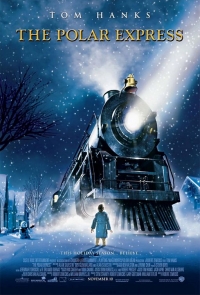 The Polar Express is a 2004 Academy Award-nominated feature film based on the children's book of the same title by Chris Van Allsburg.
The Polar Express is a 2004 Academy Award-nominated feature film based on the children's book of the same title by Chris Van Allsburg.The film, written, produced, and directed by Robert Zemeckis, is entirely live action using performance capture technology, which incorporates the movements of live actors into animated characters. It stars actor Tom Hanks in five distinct roles, including the role of Santa Claus. The film was produced by Castle Rock Entertainment in association with Shangri-La Entertainment, ImageMovers, and Playtone, for Warner Bros. Warner Bros. first released the $170 million film in both conventional and IMAX theaters on Wednesday, November 10, 2004.
The Polar Express is the soundtrack to the animated film The Polar Express, released in 2004.
Hercules
 Hercules is a 1997 American animated musical feature film, produced by Walt Disney Feature Animation and released by Walt Disney Pictures on June 27, 1997. The thirty-fifth animated feature in the Disney animated features canon, the film was directed by Ron Clements and John Musker. This movie was based on the legendary Greek mythology hero Heracles (known in the film by his Roman name, Hercules), the son of Zeus, in Greek mythology. The storyline also draws inspiration from The Karate Kid, Rocky, Superman: The Movie, and Superman II.
Hercules is a 1997 American animated musical feature film, produced by Walt Disney Feature Animation and released by Walt Disney Pictures on June 27, 1997. The thirty-fifth animated feature in the Disney animated features canon, the film was directed by Ron Clements and John Musker. This movie was based on the legendary Greek mythology hero Heracles (known in the film by his Roman name, Hercules), the son of Zeus, in Greek mythology. The storyline also draws inspiration from The Karate Kid, Rocky, Superman: The Movie, and Superman II.Though Hercules did not match the financial success of Disney's early-1990s releases, the film made $99 million in revenue in the United States during its theatrical release and $252,700,000 worldwide. The film is part of the Disney Renaissance that started in 1989 and ended in 1999. Hercules was later followed by the direct-to-video prequel Hercules: Zero to Hero, which served as a prequel to Hercules: The Animated Series, a syndicated Disney TV series focusing on Hercules during his time at the Prometheus academy.
An American Tail
 An American Tail is a 1986 animated film produced by Steven Spielberg's Amblin Entertainment, and directed by Don Bluth, originally released in movie theatres on November 21, 1986. It was the first animated film produced by Universal Pictures.
An American Tail is a 1986 animated film produced by Steven Spielberg's Amblin Entertainment, and directed by Don Bluth, originally released in movie theatres on November 21, 1986. It was the first animated film produced by Universal Pictures.
Snow White and the Seven Dwarfs
 Snow White and the Seven Dwarfs is a 1937 American film based on the eponymous European fairy tale by the Brothers Grimm. It was the first full length animated feature to be produced by Walt Disney, and the first American animated feature film in movie history.
Snow White and the Seven Dwarfs is a 1937 American film based on the eponymous European fairy tale by the Brothers Grimm. It was the first full length animated feature to be produced by Walt Disney, and the first American animated feature film in movie history.Walt Disney's Snow White premiered at the Carthay Circle Theater on December 21, 1937, and the film was released to theaters by RKO Radio Pictures on February 4, 1938. The story was adapted by storyboard artists Dorothy Ann Blank, Richard Creedon, Merrill De Maris, Otto Englander, Earl Hurd, Dick Rickard, Ted Sears and Webb Smith from the German fairy tale Snow White by the Brothers Grimm. David Hand was the supervising director, while William Cottrell, Wilfred Jackson, Larry Morey, Perce Pearce, and Ben Sharpsteen directed the film's individual sequences.
Snow White was one of only two animated films to rank in the American Film Institute's list of the 100 greatest American films of all time in 1997 (the other being Disney's Fantasia), ranking number 49. It achieved a higher ranking (#34) in the list's 2007 update, this time being the only traditionally animated film on the list. The following year AFI would name the film as the the greatest animated film of all time
In 1989, Snow White and the Seven Dwarfs was added to the United States National Film Registry as being deemed "culturally, historically, or aesthetically significant."
Snow White and the Seven Dwarfs, the soundtrack to the 1937 Walt Disney film, was the first commercially issued film soundtrack. It was released in January 1938 as Songs from Walt Disney's Snow White and the Seven Dwarfs (with the Same Characters and Sound Effects as in the Film of That Title) and has since seen numerous expansions and reissues.
Brother Bear
 Brother Bear is a 2003 Academy Award nominated traditionally-animated feature produced by Walt Disney Feature Animation and released by Walt Disney Pictures on November 1, 2003, the forty-third animated feature in the Disney animated features canon. In the film, an Inuit boy pursues a bear in revenge for a battle that he provoked in which his oldest brother is killed. He tracks down the bear and kills it, but the Spirits, angered by this needless death, change the boy into a bear himself as punishment. Originally titled Bears, it was the third and final Disney animated feature produced primarily by the Feature Animation studio at Disney-MGM Studios in Orlando, Florida; the studio was shut down in March 2004, not long after the release of this film in favor of computer animated features. A direct-to-video sequel, Brother Bear 2, followed in 2006.
Brother Bear is a 2003 Academy Award nominated traditionally-animated feature produced by Walt Disney Feature Animation and released by Walt Disney Pictures on November 1, 2003, the forty-third animated feature in the Disney animated features canon. In the film, an Inuit boy pursues a bear in revenge for a battle that he provoked in which his oldest brother is killed. He tracks down the bear and kills it, but the Spirits, angered by this needless death, change the boy into a bear himself as punishment. Originally titled Bears, it was the third and final Disney animated feature produced primarily by the Feature Animation studio at Disney-MGM Studios in Orlando, Florida; the studio was shut down in March 2004, not long after the release of this film in favor of computer animated features. A direct-to-video sequel, Brother Bear 2, followed in 2006.
The Nightmare Before Christmas
 Tim Burton's The Nightmare Before Christmas is a 1993 animated musical film written and produced by Tim Burton, directed by Henry Selick and scored by Danny Elfman. The film was based on Burton's characters and original story.
Tim Burton's The Nightmare Before Christmas is a 1993 animated musical film written and produced by Tim Burton, directed by Henry Selick and scored by Danny Elfman. The film was based on Burton's characters and original story.The film was a critical and commercial success, with particular praise awarded for Tim Burton's original storyline and stop motion animation, combined with Danny Elfman's creative musical score. Following its theatrical, and home video release, the film has earned a significant following, including merchandise, video games and other related media dedicated to the film. The film has also been theatrically re-released on several occasions, including two remastered 3-D versions released in Disney Digital 3-D on October 20, 2006,October 19, 2007 and will make a 3rd re-release on October 24th, 2008. It is rated PG for "some scary images" by the MPAA. Disney CEO, Michael Eisner, commented that the film was "too dark for children"], therefore it would be decided that Disney release the film under Touchstone Pictures. However, the 2006 3-D version of the film was released under the Walt Disney banner and the Special Edition DVD is also released under the Walt Disney banner.
The Nightmare Before Christmas is the 1993 soundtrack to the film of the same name. Composed by Danny Elfman, the soundtrack was nominated for the 1993 Golden Globe for best original score.
For the film's 2006 re-release in Disney Digital 3-D, a 2-disc special edition of the soundtrack was released, featuring covers of several of the film's songs by Fall Out Boy, Panic! at the Disco, Marilyn Manson, Fiona Apple, and She Wants Revenge. Six original demo tracks by Elfman are also included.
The Aristocats
 The Aristocats is a 1970 animated feature produced and released by Walt Disney Productions. It is the twentieth animated feature in the Disney animated features canon. Based on a story by Tom McGowan and Tom Rowe, the story revolves around a family of aristocratic cats, and how an alley cat acquaintance helps them after a butler has kidnapped them to gain his mistress' fortune which was meant to go to them. It was originally released to theaters by Buena Vista Distribution on December 11, 1970. The title is a pun on the word aristocrats.
The Aristocats is a 1970 animated feature produced and released by Walt Disney Productions. It is the twentieth animated feature in the Disney animated features canon. Based on a story by Tom McGowan and Tom Rowe, the story revolves around a family of aristocratic cats, and how an alley cat acquaintance helps them after a butler has kidnapped them to gain his mistress' fortune which was meant to go to them. It was originally released to theaters by Buena Vista Distribution on December 11, 1970. The title is a pun on the word aristocrats.The film's basic idea - an animated romantic musical comedy about talking cats in France - had previously been used in the UPA animated feature Gay Purr-ee.
"The Aristocats" is the title song from the 1970 movie of the same name. It was written by Robert & Richard Sherman at the end of the eight year tenure working for Walt Disney Productions. Actor and singer Maurice Chevalier came out of retirement to sing this song for the motion picture's soundtrack. He recorded it in English as well as in French translation ("Naturellement - les Aristocats!").
Naruto
 Naruto is an ongoing Japanese manga series written and illustrated by Masashi Kishimoto with an anime adaptation. The plot tells the story of Naruto Uzumaki, a loud, hyperactive, unpredictable, adolescent ninja who constantly searches for recognition and aspires to become a Hokage, the ninja in his village that is acknowledged as the leader and the strongest of all. The series is based on a one-shot that Kishimoto first authored in the August 1997 issue of Akamaru Jump.
Naruto is an ongoing Japanese manga series written and illustrated by Masashi Kishimoto with an anime adaptation. The plot tells the story of Naruto Uzumaki, a loud, hyperactive, unpredictable, adolescent ninja who constantly searches for recognition and aspires to become a Hokage, the ninja in his village that is acknowledged as the leader and the strongest of all. The series is based on a one-shot that Kishimoto first authored in the August 1997 issue of Akamaru Jump.The manga was first published by Shueisha in 1999 in the 43rd issue of Japan's Weekly Shōnen Jump magazine and it is still being released with forty-four volumes. The manga would be later adapted into an anime produced by Studio Pierrot and Aniplex. It premiered across Japan on the terrestrial TV Tokyo network and the anime satellite television network Animax on October 3, 2002. The first series lasted nine seasons, while Naruto: Shippūden, a sequel of the series, began its first on February 15, 2007 and is still airing.
Howls Moving Castle
 Howl's Moving Castle is a 2004 Japanese animated steampunk fantasy film written and directed by Hayao Miyazaki of Studio Ghibli and based on Diana Wynne Jones' novel of the same name. Mamoru Hosoda, director of two seasons and one movie from the Digimon series, was originally selected to direct but abruptly left the project, leaving the then retired Miyazaki to take up the director's role.
Howl's Moving Castle is a 2004 Japanese animated steampunk fantasy film written and directed by Hayao Miyazaki of Studio Ghibli and based on Diana Wynne Jones' novel of the same name. Mamoru Hosoda, director of two seasons and one movie from the Digimon series, was originally selected to direct but abruptly left the project, leaving the then retired Miyazaki to take up the director's role.The film had its world premiere at the Venice Film Festival on September 5, 2004 and was released in Japanese theaters on November 20, 2004. It went on to gross $231,710,455 worldwide, making it one of the most financially successful Japanese films in history. The film was subsequently dubbed into English by Pixar's Peter Docter and distributed in North America by Walt Disney Pictures. It received a limited release in the United States and Canada beginning June 10, 2005 and was released nationwide in Australia on September 22 and in the UK the following September.
The Legend of Zelda
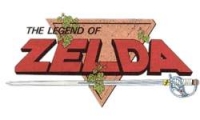 The Legend of Zelda (Zeruda no Densetsu) is a high fantasy action-adventure video game series created by game designer Shigeru Miyamoto and developed and published by Nintendo. The gameplay consists of a mixture of action, adventure, puzzle solving, role-playing and occasional platforming, stealth and racing elements. The series centers on Link, the main playable character and protagonist. Link is often given the task of rescuing Princess Zelda and the most common setting of the series, Hyrule, from Ganon who is the primary antagonist of the series. However, other settings and antagonists have appeared throughout the games, with Vaati having recently become the series' secondary antagonist. The story commonly involves a relic known as the Triforce, a set of three golden triangles of omnipotence. The protagonist in each game is not always the same iteration of Link, although the same character sometimes appears across multiple games.
The Legend of Zelda (Zeruda no Densetsu) is a high fantasy action-adventure video game series created by game designer Shigeru Miyamoto and developed and published by Nintendo. The gameplay consists of a mixture of action, adventure, puzzle solving, role-playing and occasional platforming, stealth and racing elements. The series centers on Link, the main playable character and protagonist. Link is often given the task of rescuing Princess Zelda and the most common setting of the series, Hyrule, from Ganon who is the primary antagonist of the series. However, other settings and antagonists have appeared throughout the games, with Vaati having recently become the series' secondary antagonist. The story commonly involves a relic known as the Triforce, a set of three golden triangles of omnipotence. The protagonist in each game is not always the same iteration of Link, although the same character sometimes appears across multiple games.The Legend of Zelda series has sold over 52 million copies since the release of the first game, The Legend of Zelda, and continues to be successful worldwide. The series consists of fourteen official games on all of Nintendo's major consoles, as well as several spin-offs. An animated series based on the games aired in 1989, and individual manga adaptions which are officially endorsed and commissioned by Nintendo have been produced in Japan since 1997.
The Prince of Egypt
 The Prince of Egypt is a 1998 American animated film, the first traditionally animated film produced and released by DreamWorks. The story follows the life of Moses from his birth, through his childhood as a prince of Egypt, and finally to his ultimate destiny to lead the Hebrew slaves out of Egypt, which is based on the Biblical story of Exodus.
The Prince of Egypt is a 1998 American animated film, the first traditionally animated film produced and released by DreamWorks. The story follows the life of Moses from his birth, through his childhood as a prince of Egypt, and finally to his ultimate destiny to lead the Hebrew slaves out of Egypt, which is based on the Biblical story of Exodus.Directed by Brenda Chapman, Simon Wells and Steve Hickner, the film featured songs written by Stephen Schwartz and a score composed by Hans Zimmer. The voice cast featured a number of major Hollywood actors in the speaking roles, while professional singers replaced them for the songs. The exceptions were Michelle Pfeiffer, Ralph Fiennes, Steve Martin, and Martin Short, who sang their own parts.
Three soundtracks were released simultaneously for The Prince of Egypt, each of them aimed towards a different target audience. While the other two accompanying records, the country-themed "Nashville" soundtrack and the gospel-based "Inspirational" soundtrack, functioned merely as movie tributes, the official Prince of Egypt soundtrack was the only album to contain tracks from the movie. This album combines elements from the score composed by Hans Zimmer, and movie songs by Stephen Schwartz. The songs were either voiced over by professional singers (such as Salisbury Cathedral Choir), or sung by the movie's voice actors, such as Michelle Pfeiffer and Ofra Haza. Various tracks by contemporary artists such as K-Ci & Jo-Jo and Boyz II Men were added, including the Mariah Carey and Whitney Houston duet "When You Believe", a Babyface rewrite of the original Schwartz composition, sung by Michelle Pfeiffer and Sally Dworsky in the movie.
The film was nominated for best score and won for Best Original Song at the 1999 Academy Awards for "When You Believe". The pop version of the song was performed at the ceremonies by Whitney Houston and Mariah Carey. The song, co-written by Stephen Schwartz, Hans Zimmer and with additional production by Babyface, was nominated for the Best Original Song (Motion Picture) at the 1999 Golden Globes, and was also nominated for Outstanding Performance of a Song for a Feature Film at the ALMA Awards.
Jim Brickman
 Jim Brickman (born November 20, 1961) is an American composer and pianist. Brickman is known for his solo piano compositions, which are classified as new age music. However, he is as well known for his original love songs and performing them with vocalists such as Martina McBride, Michael W. Smith, Michelle Wright and others.
Jim Brickman (born November 20, 1961) is an American composer and pianist. Brickman is known for his solo piano compositions, which are classified as new age music. However, he is as well known for his original love songs and performing them with vocalists such as Martina McBride, Michael W. Smith, Michelle Wright and others.His music career started when he was nineteen, when Jim Henson hired him to write tunes for Sesame Street. He was also hired to write commercial jingles while in college.
Brickman signed with Windham Hill Records to release his first album, No Words, in 1994. The song "Rocket To The Moon" from that album was the first solo instrumental song ever to be ranked on Billboard's charts. Four of his albums (By Heart, Picture This, The Gift, and Destiny) have all sold over 500,000 copies, qualifying them as gold records in the United States.
Brickman writes a wide variety of music. Besides his piano compositions and love songs, he has also created arrangements of other songs. Several of his albums feature arrangements of children's music; he has produced two Christmas-themed albums The Gift (1997) and Peace (2003); and his 2005 album Grace concentrates on arrangements of well-known Christian music.
Rurouni Kenshin
 Rurouni Kenshin: Meiji Swordsman Romantic Story is a Japanese manga series written and illustrated by Nobuhiro Watsuki with an anime adaptation. The fictional setting takes place during the early Meiji period in Japan. The story is about a fictional assassin named Himura Kenshin, formerly known as the "Hitokiri Battōsai" ("Hitokiri Battōsai"? or "Battosai the Manslayer" in the English dub). Kenshin later grieves for all the lives he has taken, and vows that he will never kill again.
Rurouni Kenshin: Meiji Swordsman Romantic Story is a Japanese manga series written and illustrated by Nobuhiro Watsuki with an anime adaptation. The fictional setting takes place during the early Meiji period in Japan. The story is about a fictional assassin named Himura Kenshin, formerly known as the "Hitokiri Battōsai" ("Hitokiri Battōsai"? or "Battosai the Manslayer" in the English dub). Kenshin later grieves for all the lives he has taken, and vows that he will never kill again.The manga initially appeared in Shueisha's Weekly Shōnen Jump from September 2, 1994, to November 4, 1999. The complete work consists of 28 tankōbon volumes which have sold over 47 million copies in Japan as of 2007. The United States release of the manga has been completed by Viz Media. Rurouni Kenshin is subtitled "Wandering Samurai" in some English releases, as a rough translation of "Rurouni." The English-language versions of the OVAs as well the film is released as Samurai X, although the original title was included in the DVD releases. Writer Kaoru Shizuka has written an official Rurouni Kenshin novel titled Voyage to the Moon World. The novel has been translated by Viz and distributed in the United States and Canada.
All of the series music was composed by Noriyuki Asakura and several CDs have been released by Sony Records. The first, Rurouni Kenshin OST 1 was released on April 1, 1996 and contained twenty-three songs that were used during the first episodes of the series. The second one, Rurouni Kenshin OST 2 - Departure was released on October 21, 1996 and contained fifteen tracks that were first used before the start of the Kyoto Arc. The next one, Rurouni Kenshin OST 3 - Journey to Kyoto was released on April 21, 1997 and contained the thirteen tracks that originally used in the Kyoto Arc. For the next arc, Rurouni Kenshin OST 4 - Let it Burn was released on February 1, 1998 and contained twelve tracks.
Disneyland
 It's a Small World (formatted “it's a small world” by The Walt Disney Company) is an attraction at several Walt Disney theme parks: Disneyland (in California), the Magic Kingdom (in Florida), Tokyo Disneyland, Disneyland Park at Disneyland Resort Paris and Hong Kong Disneyland. The ride features a multitude of audio-animatronic figures in the style of children of the world singing the ride's title track (composed by the Sherman Brothers), which has a theme of global peace.
It's a Small World (formatted “it's a small world” by The Walt Disney Company) is an attraction at several Walt Disney theme parks: Disneyland (in California), the Magic Kingdom (in Florida), Tokyo Disneyland, Disneyland Park at Disneyland Resort Paris and Hong Kong Disneyland. The ride features a multitude of audio-animatronic figures in the style of children of the world singing the ride's title track (composed by the Sherman Brothers), which has a theme of global peace.
Quest for Camelot
 Quest for Camelot is an animated feature from Warner Bros. Animation, released in 1998. It was retitled The Magic Sword in Asia and The Magic Sword: Quest for Camelot in the UK. In France, the movie was titled Excalibur l'épée magique what can be translated Excalibur the magic sword. It is based on the novel The King's Damsel by Vera Chapman and was shot in Austin, Texas.
Quest for Camelot is an animated feature from Warner Bros. Animation, released in 1998. It was retitled The Magic Sword in Asia and The Magic Sword: Quest for Camelot in the UK. In France, the movie was titled Excalibur l'épée magique what can be translated Excalibur the magic sword. It is based on the novel The King's Damsel by Vera Chapman and was shot in Austin, Texas.The movie is about a young girl named Kayley who wants to be a knight of the Round Table in Camelot like her father; Sir Lionel, a blind man named Garrett who wishes only to be left alone, and their quest to find Excalibur.
Quest for Camelot: Music from the Motion Picture is the soundtrack to Warner Bros.' 1998 theatrical animated feature Quest for Camelot. It contains songs from the film performed by various artists, and selections of the film's score composed by Patrick Doyle and David Foster. The album was originally released on May 5, 1998 by Atlantic Records.
Although the film was not a critical or commercial success, the soundtrack did receive a certain level of praise. The album peaked at #117 on the Billboard 200, and won the Golden Globe Award for Best Original Song for "The Prayer", and was also nominated for the Academy Award for Best Original Song, also for "The Prayer" (though it lost the latter to "When You Believe" from Dreamworks' The Prince of Egypt).
Sailor Moon
 Sailor Moon is the title of a Japanese media franchise created by Naoko Takeuchi. It is generally credited with popularizing the concept of a sentai (team) of magical girls, as well as the general re-emergence of the magical girl genre itself.
Sailor Moon is the title of a Japanese media franchise created by Naoko Takeuchi. It is generally credited with popularizing the concept of a sentai (team) of magical girls, as well as the general re-emergence of the magical girl genre itself.The story of the various metaseries revolves around the reincarnated defenders of a kingdom that once spanned the solar system, and the evil forces that they battle. The major characters—called Sailor Senshi (literally "Sailor Soldiers"; frequently called "Sailor Scouts" in the North American version)—are teenage girls who can transform into heroines named for the moon and planets (Sailor Moon, Sailor Mercury, Sailor Mars, etc). The use of "Sailor" comes from a style of girls' school uniform popular in Japan, the sērā fuku (sailor outfit), after which the Senshi's uniforms are modeled. The elements of fantasy in the series are heavily symbolic and often based on mythology.
Music for the Sailor Moon metaseries was written and composed by numerous people, including frequent lyrical contributions by creator Naoko Takeuchi. All of the background musical scores, including the spinoffs, games, and movies, were composed and arranged by Takanori Arisawa, who earned the "Golden Disk Grand Prize" from Columbia Records for his work on the first series soundtrack in 1993. In 1998, 2000, and 2001 he won the JASRAC International Award for most international royalties, owing largely to the popularity of Sailor Moon music in other nations.
101 Dalmatians
 One Hundred and One Dalmatians, often written as 101 Dalmatians, is the seventeenth animated feature in the Disney animated features canon. It was made and produced by Walt Disney, and it was originally released to theaters on January 25, 1961 by Buena Vista Distribution. It is based on the novel The Hundred and One Dalmatians by Dodie Smith.
One Hundred and One Dalmatians, often written as 101 Dalmatians, is the seventeenth animated feature in the Disney animated features canon. It was made and produced by Walt Disney, and it was originally released to theaters on January 25, 1961 by Buena Vista Distribution. It is based on the novel The Hundred and One Dalmatians by Dodie Smith.The film features Rod Taylor as the voice of Pongo, the first of the Dalmatians, and Betty Lou Gerson as the voice of the villainous Cruella de Vil. The plot centers on the fate of the kidnapped puppies of Pongo and Perdita.
Hillsong United
 The Hillsong United band is an Australian rock and worship band, a part of Hillsong Church's youth ministry Hillsong United. Their music is a contemporary style of praise and worship tempered with mainstream rock.
The Hillsong United band is an Australian rock and worship band, a part of Hillsong Church's youth ministry Hillsong United. Their music is a contemporary style of praise and worship tempered with mainstream rock.Current members of the Hillsong United band include Jonathon Douglass (J.D.), Jadwin "Jad" Gillies, Holly Watson, Annie Garratt, Bec Gillies, and Michelle Fragar, daughter of Russell Fragar. Michael Guy Chislett plays guitar and Matthew Tennikoff plays bass guitar. Former original drummer Luke Munns made a transition from the drums to front the rock/indie band LUKAS. Popular New Zealand artist Brooke Fraser recently joined the band when she joined the church, first appearing on United We Stand.
The annual Hillsong United CD/DVD was recorded over many years during their October youth conference Encounterfest, with the album released in the first quarter of the following year. The 2007 album All of the Above was the first album to be fully studio recorded, containing videos of songs on the DVD. The band has toured in a number of countries, leading worship to thousands in North and South America, Europe and Asia.
Search for Free Sheet Music
You can make a search through the entire collection of sheets.
You can make a search through the entire collection of sheets.





